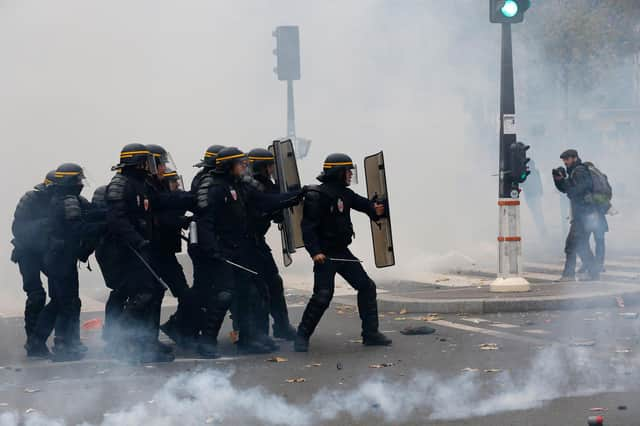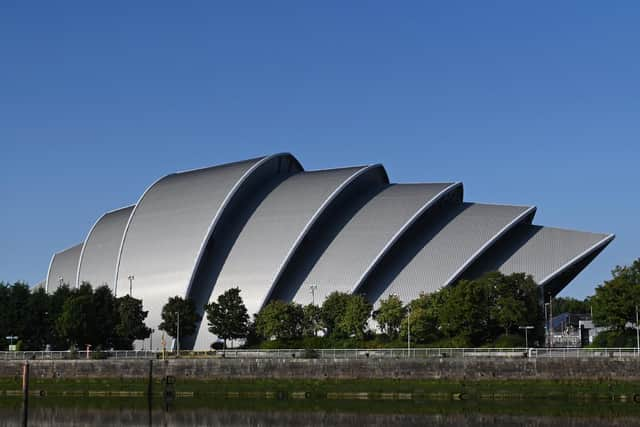Cop26 climate change summit: 9/11-style attacks, mini-submarines and lone-wolf terrorists are all threats that must be guarded against – Stuart Crawford


Somewhat hysterically claiming to be “a pivotal moment in the fight against climate change”, it will see up to 200 heads of state from around the world congregate in the Dear Green Place to discuss how they’re going to save the planet at the same time as rebooting the global economy post-Covid 19. Good luck with that one.
Leaving aside for the moment that Glasgow is, by all accounts, putting it delicately, a bit of a midden at the moment cleanliness-wise – I’m allowed to say this being a Weegie myself – what are the implications of hosting the conference for this once great city?
Advertisement
Hide AdAdvertisement
Hide AdWell, it will bring much-needed revenue to the city as an estimated 90,000 delegates, observers, media people, and heads of state attend, no doubt booking out Glasgow’s hotels, restaurants, and pubs. The cash injection will be most welcome, as will the council’s endeavours to spruce up the bits of the city that delegates are most likely to see. Blackhill and Faifley are likely to miss out yet again I’m afraid.
But it’s the security implications that I’m most interested in. For 12 days in November, Glasgow will become a target-rich environment for the bad guys (and girls) who may seek to disrupt proceedings or do actual harm.
At the extreme end of the spectrum, we could postulate a 9/11-type hijacked aircraft attack on the Scottish Events Campus on the banks of the Clyde when all the important people are gathered together in one place. This scenario is, of course, highly unlikely but still has to be catered for, so I guess there will be a no-fly zone imposed over the city centre and a couple of RAF Typhoons stationed at one of the Glasgow airports just in case.
Slightly more likely is the threat from drones or unmanned aerial vehicles (UAVs), which are rapidly becoming the weapon of choice for armed groups around the world. These are rather more difficult to defend against, but don’t be surprised if strange, temporary structures plus increased numbers of “maintenance staff” appear on some of Glasgow’s taller buildings nearer the time.


Back down on land, the threat spectrum runs from attack by armed terrorists all the way to protests by anti-vaxxers, anti-maskers, and the middle class eco-berks of Extinction Rebellion and Insulate Britain, plus the usual mix of anarchists, nihilists, and ne’er-do-wells who will turn up just for the rammy. The police and security services will have most of this under their control, although some disruption to everyday life is inevitable. Expect barriers and checkpoints all round the immediate area.
And for completeness’ sake, we should consider the sea or, more accurately, river-borne threat. With the campus being on the Clyde, there is the highly unlikely but possible risk of the bad guys using it as an avenue of approach. We can have a good laugh at the idea of a bomb-in-a-boat, but if narcos can smuggle drugs in mini-submarines into the US then it shouldn’t be discounted, however fantastic that might seem.
What is beyond doubt is that the police and security services have a gargantuan task on their hands. The sheer numbers of participants and the spread of venues where they will stay, meet, and eat, and the routes they will travel make it impossible for everywhere to be covered. The best defence, as always, is intelligence and we have to hope that the relevant agencies are on top of their game.
But if I were one of the bad guys, which obviously I’m not, none of the security measures to be imposed would faze me, because I’d be there already. In fact, I and my colleagues would have been there for some considerable time, given the publicity surrounding the event and the delay for a year because of Covid.
Advertisement
Hide AdAdvertisement
Hide AdWe could be on the staff at the venues, or delivery drivers, or waiters and barmen in one of the many hotels where delegates will stay. We could be lorry drivers, bus drivers, security staff, in fact any of the myriad of employees who will service the conference directly or indirectly. We could be anywhere and everywhere, and would have stashed the deadly tools of our trade on site lang syne.
So, ideally, all these various folk would need to be security vetted which, given the numbers involved, just ain’t going to happen. Perhaps some other methodology can mitigate the risk here but those who would keep us safe have some nice decisions to make on priorities and targeting. I don’t envy them their job.
Finally, we need to address that security services’ nightmare, the lone-wolf terrorist. Typically this will be a young male who has spent much of his teens and early 20s online feeding his anger. He’ll be on nobody’s radar and might just wake up one morning and decide that he needs to do something, anything, to assuage his rage, perhaps just taking a knife from the kitchen drawer and attacking the first people he meets.
There is no counter to this except eternal vigilance and rapid reaction when and if an incident of this nature occurs. Thankfully such attacks are few and far between.
But in short, terrorists seek to strike where the security agencies are at their weakest, or where they are absent. And as the old adage has it, the good guys have to be successful all of the time, whereas the bad guys only have to be successful once. Let’s hope, though, that Cop26 passes off without any such horrors being visited upon us and that all can go home safe and sound at its conclusion.
Stuart Crawford is a former Lieutenant Colonel in the Royal Tank Regiment
